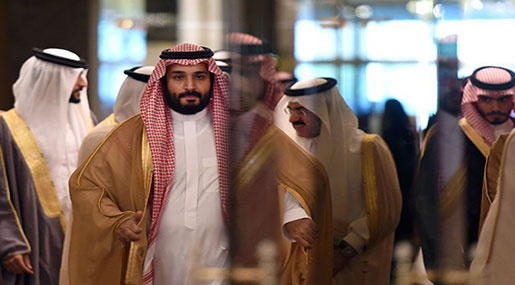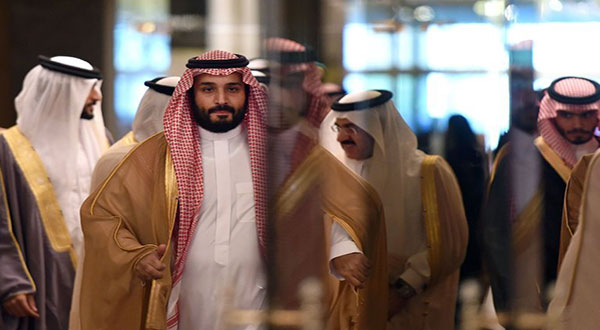
Saudi Arabia Detains Critics as New Crown Prince Consolidates Power

Ben Hubbard
Saudi Arabia has begun a wide-ranging crackdown against perceived opponents of the policies of the kingdom's new crown prince, Mohammed bin Salman.

Over the last week, 16 people were held, their friends, relatives and associates said in interviews. They include prominent Islamic clerics, academics, a poet, an economist, a journalist, the head of a youth organization, at least two women and one prince, a son of a former king.
Some of them were taken from their homes in unannounced raids by security forces, and their computers, cellphones and personal papers were seized, the friends and relatives said. Those arrested have been held incommunicado, and it is not clear if they have been formally charged with crimes. Saudi Arabia has not publicly released any evidence it might have against them.
Saudi activists have circulated lists of 30 or more people they say have been detained, but the scale and goals of the crackdown remain unclear, even to those who fear they could be targeted.
"It is absurd," said Jamal Khashoggi, a veteran Saudi journalist who has advised the Saudi government and is now staying in the United States because he fears arrest if he returns home. He dismissed the idea promoted by government supporters on social media that the detained individuals were plotting against the country.
"There were no conspiracies," he said. "There was nothing that called for such arrests. They are not the members of a political organization, and they represent different points of view."
Saudi officials did not respond to requests for comments.
The crackdown comes at a critical time for the kingdom, one of the few remaining absolute monarchies. The drop in oil prices has undermined its economy and the new crown prince has proposed sweeping measures to reduce the kingdom's dependence on oil.
While many of the proposed changes are popular with Saudis and hailed as necessary for the kingdom's future, some see the 32-year-old prince as a power-hungry upstart who is endangering the kingdom by overturning decades of tradition. Even if the reforms work, they could hit many Saudis in the wallet, lowering their standard of living.
Crown Prince Mohammed, a son of King Salman, pushed aside his rival, Mohammed bin Nayef, earlier this year to become his father's heir to the throne and has worked to consolidate power. Many Saudis and foreign officials have speculated that King Salman could abdicate in favor of his son; some speculate that the arrests aimed to smooth that transition by tamping down criticism of his policies.
Others have cheered the arrests, accusing the detainees of working to destabilize the kingdom and suggesting the names of others they believe are beholden to foreign powers.
The young prince has spearheaded the kingdom's military intervention in Yemen, which has largely failed to accomplish its goals, as well as its boycott of neighboring Qatar, which Saudi Arabia and three of its Arab allies accuse of sponsoring terrorism and meddling in the affairs of neighboring states. Qatar has denied the allegations, and no other countries have joined the boycott.
Saudi Arabia, where political parties are banned and the news media tightly controlled, has long had tight restrictions on expression, but the government has signaled even less tolerance now for dissenting views.
On Monday, as the arrests were picking up, the State Security Directorate announced that it had arrested and was investigating a number of Saudis and foreigners who were working "for the benefit of foreign parties against the security of the kingdom."
A day later, a Twitter account run by the Interior Ministry, which oversees the security forces, called on Saudi citizens to report anyone who "published terrorist or extremist ideas" via the governmental cellphone application "We Are All Security" that was designed to facilitate crime reporting.
None of those arrested had publicly called for the overthrow of the government or for acts of extremism. But since the government has branded Qatar a supporter of terrorism, any show of support for Saudi Arabia's small neighbor is suspect.
Mr. Khashoggi, the Saudi journalist, said the only characteristic the detained shared was that they had not vocally joined the condemnation of Qatar.
"They are the silent or the people who refused to jump in the wagon with the government in its campaign against Qatar," he said. "They saw that this was not the thing to do, but they did not go against the government."
Among the most prominent was Salman al-Awda, a popular Saudi cleric with a large social media following and a history of not sticking with the government line.
After a telephone call between Prince Mohammed and the emir of Qatar, Shiekh Tamim bin Hamad al-Thani, Mr. Awda wrote on Twitter that he hoped they would reconcile.
"May God harmonize their hearts for the good of their people," he wrote.
He was arrested from his home over the weekend and has not been heard from since, according to three Saudis who know him. Like other associates of the detained, they spoke on condition of anonymity for fear that they, too, could be arrested.
That is what happened to Mr. Awda's brother, Khalid, who was arrested after tweeting about his brother's arrest.
"The size of the demagogy we enjoy has been revealed," he wrote.
Also caught up in the sweep was Prince Abdulaziz bin Fahd, a son of King Fahd and a nephew of King Salman, according to an associate of the royal family and another person briefed on the matter.
Prince Abdulaziz, who had upset the government with his Twitter feed, was confined to a palace in the Saudi city of Mecca earlier this month after meeting King Salman at the end of the hajj pilgrimage. It remains unclear whether he is still there or is now being held elsewhere.
Even longtime dissidents have been surprised by the arrest campaign.
"What is happening, I haven't seen it in my life," said Abdulaziz al-Hussan, a Saudi lawyer who lives in self-imposed exile in the United States after falling afoul of the government for his political activism.
The government had long managed nonviolent dissidents quietly, by summoning them to security offices for scolding and making them sign vows to stay in line before releasing them, he said. But this time, he said, the government had sent security forces to their homes to arrest them in front of their wives and children, as they would do with suspected terrorists.
Mr. Hussan said he believed the crackdown was an effort by the crown prince to shore up his power, and called the action an overreaction because little organized political opposition remained in the kingdom.
"No one is going to take away your rule or keep you from becoming king," he said, rhetorically addressing Crown Prince Mohammed. "It's really a joke."
Also arrested was Essam al-Zamil, a writer and economist who had taken to Twitter to express doubts about the plan to privatize a portion of Saudi Aramco, the state oil monopoly. Mr. Zamil later deleted the posts.
He was joined by Ziyad bin Naheet, a poet who had used social media to praise the country and its policies. His friends assumed he had been arrested for criticizing the harsh rhetoric against Qatar.
"The role that the media are playing today is a very, very, very negative and bad role, and I think there is no logical person who is pleased with what is happening," Mr. bin Naheet said in a video.
The largest number of those arrested were clerics, some of them Islamist activists...
But not all. Hassan al-Maliki had written that Wahhabism, the ultraconservative strain of Islam promoted by the Saudi state, fueled extremism by demonizing non-Muslims. He, too, was arrested, his son Alabbas wrote on Twitter.
"We confirm that my father, Sheikh Hassan al-Maliki, is not a political opponent and does not belong to any political party," he wrote.
Source: NYT, Edited by website team
Comments



